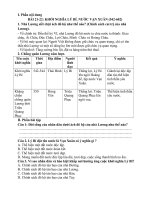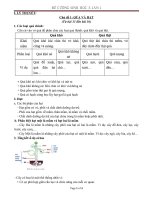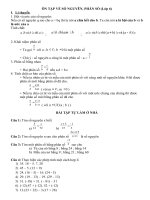đề cương ôn tập các môn khối 12 lần 2
Bạn đang xem bản rút gọn của tài liệu. Xem và tải ngay bản đầy đủ của tài liệu tại đây (127.29 KB, 8 trang )
<span class='text_page_counter'>(1)</span><div class='page_container' data-page=1>
<b>TRƯỜNG THPT GÀNH HÀO</b> <b> ĐỀ ÔN NĂM HỌC 2019-2020</b> <b>đề 2</b>
<b> MÔN: TIẾNG ANH 12</b>
<i><b>Mark the letter A, B, C, or D on your answer sheet to indicate the word whose underlined part differs</b></i>
<i><b>from the other three in pronunciation in each of the following questions.</b></i>
<b>Question 1: A. washed</b> <b>B. formed</b> <b>C. turned</b> <b>D. boiled</b>
<b>Question 2: A. house</b> <b>B. mouth</b> <b>C. could</b> <b>D. found</b>
<i><b>Mark the letter A, B, C, or D on your answer sheet to indicate the word that differs from the other three</b></i>
<i><b>in the position of primary stress in each of the following questions.</b></i>
<b>Question 3: A. inform</b> <b>B. explore</b> <b>C. prevent</b> <b>D. cancel</b>
<b>Question 4: A. attitude</b> <b>B. manager</b> <b>C. invention</b> <b>D.company</b>
<i><b>Mark the letter A, B, C, or D on your answer sheet to indicate the correct answer to each of </b></i>
<i><b>the following questions.</b></i>
<b>Question 5: You should turn off the lights before going out to save </b> .
<b>A. electricity</b> <b>B. electrify</b> <b>C. electric</b> <b>D. electrically</b>
<b>Question 6: </b>Johnny used to be one of the most _______ athletes in my country.
A. succeed B. success <b>C. successful </b> D. successfully
<b>Question 7: Event organisers should plan everything carefully so as to leave nothing to </b> .
<b>A. possibility</b> <b>B. mistake</b> <b>C. opportunity</b> <b>D. chance</b>
<b> Question 8: You should take regular breaks when using computers so that you don’t ____</b> your eyes.
<b>A. injure</b> <b>B. hurt</b> <b>C. exert</b> <b>D. strain</b>
<b> Question 9: When you travel on the metro, you must be very_________________about pickpockets.</b>
<b>A. sceptical</b> <b>B. alert</b> <b>C. cautious</b> <b>D. suspicious</b>
<b>Question 10: There’s an art_______________on at the gallery in town that we really shouldn’t miss.</b>
<b>A. exhibition</b> <b>B. showing</b> <b>C. presentation</b> <b>D. screening</b>
<b>Question 11: I choose __________ here rather than anywhere else.</b>
A. to work B. work C. to be work D. be worked
<b>Question 12: Unfortunately, we can’t afford ___________ a new car this year.</b>
A. to buy B. to have bought C. be buying D. buy
</div>
<span class='text_page_counter'>(2)</span><div class='page_container' data-page=2>
<b>A. learned</b> <b>B. were learning</b> C. will learn <b>D. would learn</b>
<b>Question 14: He seldom goes to the library, ________?</b>
A. doesn't he B. is he C. does he D. isn't he
<b>Question 15: _______, I will give him the report.</b>
A. When he will return B. When he returns
C. Until he will return D. No sooner he returns
<b>Question 16: We ____ him since he ____ married.</b>
A. didn’t see/got B. haven’t seen/got C. don’t/get D. hadn’t seen/got
<b>Qustion 17: If something urgent has _______ up, phone me immediately and I will help you.</b>
A. picked B. come C. kept D. brought
<b>Qustion 18: Wild animals ______ in their natural habitat will have a better and longer life than those which </b>
are kept in protected areas.
A. live B. to live C. living D. lived
<i><b>Mark the letter A, B, C, or D on your answer sheet to indicate the word(s) CLOSEST in meaning to the </b></i>
<i><b>underlined word(s) in each of the following questions.</b></i>
<b>Question 19: The discovery of the new planet was regarded as a major breakthrough in astronomy.</b>
A. promised B. doubted C. considered D. refused
<b>Question 20: Mary has finally managed to get round her strict parents to let her go on a three- day excursion </b>
with her classmates.
A. permit B. persuade C. offer <b>D. support</b>
<i><b>Mark the letter A, B, C, or D on your answer sheet to indicate the word(s) OPPOSITE in meaning to the </b></i>
<i><b>underlined word(s) in each of the following questions.</b></i>
<b>Question 21: Traffic congestion in big cities deters many people from using their private cars at peak hours.</b>
<b>A. prohibits</b> <b>B. protects</b> <b>C. encourages </b> <b>D. limits</b>
<b>Question 22: These days, many people only read printed newspapers once in a while as they tend to access </b>
information online.
</div>
<span class='text_page_counter'>(3)</span><div class='page_container' data-page=3>
<i><b>Mark the letter A, B, C, or D on your answer sheet to indicate the option that best completes each of the </b></i>
<i><b>following exchanges.</b></i>
<b>Question 23: Jack is inviting Mary to his party.</b>
- Jack: ''Would you like to come to my party this weekend?''
- Mary: '' .''
<b>A. Yes, I'd love to</b> <b>B. No, don't worry</b> <b>C. You're welcome</b> <b>D. I'm afraid so</b>
<b>Question 24: Laura and Mitchell are talking about their school curriculum.</b>
- Laura: ''I think Art should be a compulsory subject.''
- Mitchell: '' . Art helps develop creativity.''
<b>A. I quite agree</b> <b>B. You must be kidding</b>
<b>C. I'm of the opposite opinion</b> <b>D. I don't think that's a good idea</b>
<i><b>Mark the letter A, B, C, or D on your answer sheet to indicate the sentence that is closest in meaning to</b></i>
<i><b>each of the following questions.</b></i>
<b>Question 25: In Vietnam, football is more popular than basketball.</b>
A. In Vietnam, basketball is not as popular as football.
B. In Vietnam, basketball is more popular than football.
C. In Vietnam, football is not as popular as basketball
D. In Vietnam, football is as popular as basketball.
<b>Question 26: ''What are you going to do after school, Anne?'' Kevin asked.</b>
A. Kevin asked Anne what was she going to do after school.
B. Kevin asked Anne what she was going to do after school.
C. Kevin wanted to know what Anne would do after school.
D. Kevin wanted to know what would Anne do after school.
</div>
<span class='text_page_counter'>(4)</span><div class='page_container' data-page=4>
B. Sally might not have paid for her travel in advance.
C. Sally may not have paid for her travel in advance.
D. Sally couldn’t have paid for her travel in advance.
<i><b>Mark the letter A, B, C, or D on your answer sheet to indicate the sentence that best combines each pair of</b></i>
<i><b>sentences in the following questions.</b></i>
<b>Question 28: Jenifer rejected the job offer. She now regrets it.</b>
A. Jenifer regrets not having rejected the job offer.
B. If only Jenifer didn’t reject the job offer.
C. Jenifer wishes she hadn’t rejected the job offer.
D. Jenifer regrets to reject the job offer.
<b>Question 29: The student next to me kept chewing gum. That bothered me a lot.</b>
<b>A. The student next to me kept chewing gum, which bothered me a lot.</b>
B. The student next to me kept chewing gum, that bothered me a lot.
C. The student next to me kept chewing gum bothering me a lot.- rút gọn loại 1
D. The student next to me kept chewing gum bothered me a lot. – rút gọn loại 2
<i><b>Read the following passage and mark the letter A, B, C, or D on your answer sheet to indicate </b></i>
<i><b>the correct word or phrase that best fits each of the numbered blanks from 30 to 34.</b></i>
Advances in mobile technology and social networking websites mean we spend more time
online than ever before. If Facebook were a country, it would be the third largest in the world by
population (The Economist, 2010). It is (30) not surprising that so many psychologists,
sociologists, and others are eager to give their thoughts on how this is impacting negatively on our
society.
The biggest criticism levelled at social networking is that young people are losing their
offline friends to online friends (31) are unable to provide the same deep
connection and emotional support. However, a lot of research shows these criticisms are
generally (32) . Allen et al. (2010) discovered that it is socially adjusted
adolescents who are more likely to have a networking profile than those who are not. One study
by the Pew Internet and American Life Project (2009) found that people are not (33) _______
</div>
<span class='text_page_counter'>(5)</span><div class='page_container' data-page=5>
much more diverse set of people than in the real world, so we share knowledge with people
from a wide (34) _________of backgrounds.
(Adapted from ''Skillful Reading & Writing 4''by Mike Boyle and Lindsay Warwick)
<b>Question 30: A. while</b> B. however C. despite D. therefore
<b>Question 31: A. what</b> B. who C. which D. whom
<b>Question 32: A. uninvolved</b> B. unequalled C. unsettled D. unfounded
<b>Question 33: A. making</b> B. providing C. combining D. substituting
<b>Question 34: A. vary</b> B. variety C. various D. variously
<i><b>Read the following passage and mark the letter A, B, C or D on your answer sheet to indicate the correct</b></i>
<i><b>answer to each of the following questions. </b></i>
The word robot first appeared in a 1921 stage play by Czech writer Karel Capek. In the play, a man
makes a machine that can think, which he calls a robot and which ends up killing its owner. In the 1940s, the
American science fiction writer Isaac Asimov wrote a series of stories about robots and invented the term
<i>robotics, the science of robots. Meanwhile, in the real world, the first robots were developed by an engineer,</i>
Joseph F. Engelberger, and an inventor, George C. Devol. Together they started Unimation, a manufacturing
company that produces the first real robot in 1961, called the Unimate. Robots of this type were installed at a
General Motors automobile plant and proved to be a success. They worked reliably and saved money for
General Motors, so other companies were soon acquiring robots as well.
These industrial robots were nothing like the terrifying creatures that can often be seen in science
fiction films. In fact, these robots looked and behaved nothing like humans. They were simply pieces of
computer-controlled machinery, with metal “arms” or “hands”. Since they were made of metal, they could
perform certain jobs that were difficult or dangerous for humans, particularly jobs that involve high heat.
And since robots were tireless and never got hungry, sleepy, or distracted, they were useful for tasks that
would be tiring or boring for humans. Industrial robots have been improved over the years, and today they
are used in many factories around the world. Though the use of robots has meant the loss of some jobs, at the
same time other jobs have been created in the design, development, and production of the robots.
<i><b>Rise of the Robots, Silicon Valley Entrepreneur, Martin Ford, 1988. </b></i>
<b>Question 35: What is Unimation? </b>
<b>A. It’s the name of a robot inventor </b> <b>B. It’s the name of a robot </b>
<b>C. It’s a robot making program </b> <b>D. It’s the producer of the first robot </b>
<b>Question 36: What can be said about Karel Capek? </b>
<b>A. He was the first to create the word “robot” </b> <b>B. He is an American writer </b>
<b>C. He made a robot </b> <b>D. He made a robot in order to kill a person </b>
<b>Question 37: Which of the following is NOT mentioned as a characteristic of robots? </b>
<b>A. They don’t need food </b> <b>B. They are not distracted </b>
<b>C. They are tiring </b> <b>D. They can do jobs involving high heat </b>
</div>
<span class='text_page_counter'>(6)</span><div class='page_container' data-page=6>
<b>A. They behave like humans </b> <b>B. They controlled machinery </b>
<b>C. They look like humans </b> <b>D. They are computer-controlled machines </b>
<b>Question 39: When did the word “robot” appear? </b>
<b>A. in the 1920s </b> <b>B. in the 19th century </b> <b>C. in the 40s </b> <b>D. in the 60s </b>
<i><b>Read the following passage and mark the letter A, B, C or D on your answer sheet to indicate the correct</b></i>
<i><b>answer to each of the following questions. </b></i>
<b>PHOTOSYNTHESIS</b>
Almost all living things ultimately get their energy from the sun. In a process called photosynthesis,
plants, algae, and some other organisms capture the sun's energy and use it to make simple sugars such as
glucose. Most other organisms use these organic molecules as a source of energy. Organic materials contain
a tremendous amount of energy. As food, they fuel our bodies and those of most other creatures. In such
forms as oil, gas, and coal, they heat our homes, run our factories and power our cars.
Photosynthesis begins when solar energy is absorbed by chemicals called photosynthetic pigments that
are contained within an organism. The most common photosynthetic pigment is chlorophyll. The bright
green color characteristic of plants is caused by it. Most algae have additional pigments that may mask the
green chlorophyll. Because of these pigments, algae may be not only green but brown, red, blue or even
black.
In a series of enzyme-controlled reactions, the solar energy captured by chlorophyll and other pigments
is used to make simple sugars, with carbon dioxide and water as the raw materials. Carbon dioxide is one of
very few carbon- containing molecules not considered to be organic compounds. Photosynthesis then
converts carbon from an inorganic to an organic form. This is called carbon fixation. In this process, the
solar energy that was absorbed by chlorophyll is stored as chemical energy in the form of simple sugars like
glucose. The glucose is then used to make other organic compounds. In addition, photosynthesis produces
oxygen gas. All the oxygen gas on earth, both in the atmosphere we breathe and in the ocean, was produced
by photosynthetic organisms. Photosynthesis constantly replenishes the earth's oxygen supply.
Organisms that are capable of photosynthesis can obtain all the energy they need from sunlight and do
not need to eat. They are called autotrophs. Plants are the most familiar autotrophs on land. In the ocean,
algae and bacteria are the most important autotrophs. Many organisms cannot produce their own food and
must obtain energy by eating organic matter. These are called heterotrophs.
<b>Advances in Photosynthesis and Respiration, Hardback.1990. </b>
<b>Question 40: From the passage, we can see that ______. </b>
<b>A. Algae are a kind of simple plants. </b>
<b>B. Most plants have additional pigments. </b>
<b>C. Oxygen helps the process of photosynthesis. </b>
<b>D. Autotrophs obtain energy by eating organic matter. </b>
</div>
<span class='text_page_counter'>(7)</span><div class='page_container' data-page=7>
<b>A. a perfect solution to the energy problem </b> <b>B. a permanent and everlasting source of energy </b>
<b>C. useless to most bacteria and algae </b> <b>D. essential for every organism on earth </b>
<b>Question 42: The word “pigments” is closest in meaning to ______. </b>
<b>A. colours </b> <b>B. chemicals </b> <b>C. organisms </b> <b>D. characteristics </b>
<b>Question 43: The word “replenishes” in the third paragraph is closest in meaning to ______. </b>
<b>A. renews </b> <b>B. refines </b> <b>C. refills </b> <b>D. regulates </b>
<b>Question 44: The phrase “this process” refers to the process of ______. </b>
<b>A. storing chemical energy </b> <b>B. absorbing solar energy </b>
<b>C. photosynthesis </b> <b>D. carbon fixation </b>
<b>Question 45: The word “fuel” is similar in meaning to ______. </b>
<b>A. provide nutrients for </b> <b>B. produce organic materials </b>
<b>C. give fuel to </b> <b>D. help to function </b>
<b>Question 46: What can be inferred about algae? </b>
<b>A. Green algae are less common than other colors of algae. </b>
<b>B. Algae are photosynthetic organisms. </b>
<b>C. They are chemically different from other plants. </b>
<b>D. They are ineffective producers of sugars. </b>
<b>Question 47: Which of the following is NOT true? </b>
<b>A. Organic materials contain an amount of energy.</b> <b>B. Plants capture the sun's energy to make sugars. </b>
<b>C. Plants are familiar heterotrophs. </b> <b>D. Photosynthesis produces oxygen gas. </b>
<i><b>Mark the letter A, B, C, or D on your answer sheet to indicate the underlined part that needs correction in</b></i>
<i><b>each of the following questions. </b></i>
<b>Question 48: It is important that you turned off the heater every morning before you leave for class. </b>
<b>A. before </b> <b>B. turned off </b> <b>C. It </b> <b>D. leave for</b>
<b>Question 49: The children had such difficult time when they began school in their new neighborhood that</b>
their parents decided never to move again.
<b>A. Began </b> <b>B. never </b> <b>C. such difficult time </b> <b>D. to move </b>
<b>Question 50: Alike other forms of energy, natural gas may be used to heat homes, cook food, and even run</b>
automobiles.
</div>
<span class='text_page_counter'>(8)</span><div class='page_container' data-page=8></div>
<!--links-->









